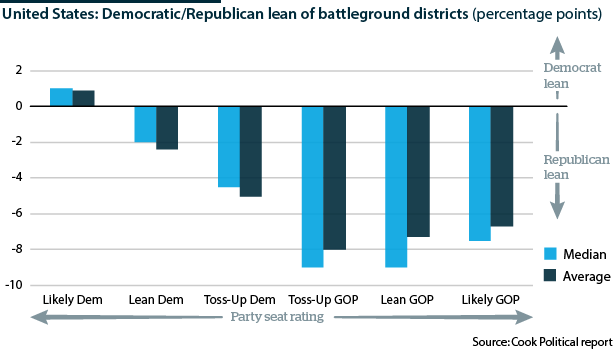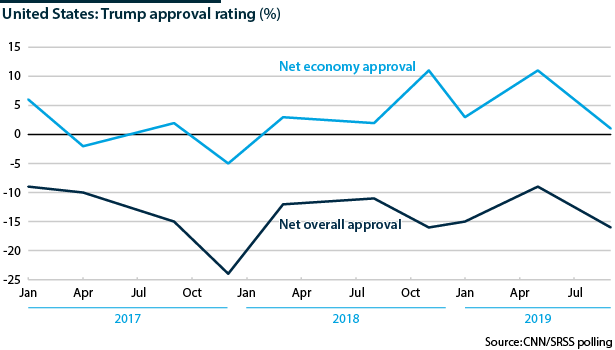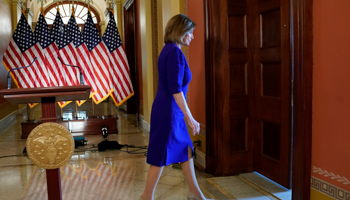Trump will stay but US legislation will suffer
Despite an impeachment probe, the Democrats’ best chance of removing Trump from office is still via the ballot box
Later today, the White House is expected to release a full transcript of President Donald Trump’s July call with Ukrainian President Volodymyr Zelensky, whom Trump met briefly today at UN meetings in New York. This comes after House of Representatives Speaker Nancy Pelosi yesterday announced impeachment investigations against Trump. The Democrats suspect that Trump blocked an aid package to pressure Ukraine into investigating former Vice President Joe Biden, to undermine his position as leading contender for the 2020 Democratic presidential nomination.
What next
Pelosi’s move is less of a watershed than might be imagined: the House, which is already investigating Trump, will not necessarily pass articles of impeachment and even if it does, the Republican-held Senate, sensing a partisan attack by Democrats, is unlikely to remove Trump from office absent irrefutable evidence of ‘high crimes and misdemeanours’.
Subsidiary Impacts
- Trump’s wish to release transcripts could aid his defence but undermine executive branch privacy.
- The Republican-led Senate may initiate investigations of House Democrats.
- The Republicans are unlikely to drop Trump from the 2020 ticket.
- The Trump impeachment risk will increase if Democrats win the House and Senate in 2020.
- The acting director of national intelligence will testify to Congress on the whistle-blower report tomorrow.
Analysis
Since Trump's election there have been many calls from within the Democratic Party to impeach him. These calls gained strength in November 2018 when the Democrats won the House.
Constitutionally, the House can initiate articles of impeachment when it suspects 'high crimes and misdemeanours' by public officials. A Senate trial follows where a two-thirds vote is required to remove an official from office. The House can also censure officials, a reprimand that does not entail their removal.
Democrats have been investigating Trump, his business dealings and his administration via six House committees: judiciary, intelligence, foreign affairs, oversight, ways and means, and financial services. The White House has cooperated, to the extent it feels cooperation does not threaten executive branch efficiency and privilege -- a balance neither party was ever going to agree on (see UNITED STATES: Subpoena and privilege fights will grow - May 10, 2019).
Pelosi's strategy
Pelosi has been under pressure from within her caucus (all of whom she met yesterday prior to her announcement) to initiate impeachment, but she has instead called for investigations and to await anything they uncover.
Part of Pelosi's calculus is that impeachment is political: initiation might be viewed by voters not as legitimate congressional oversight, but a partisan attack. That could mean losing swing districts that the Democrats need to retain their House majority in 2020, and perhaps to win the Senate.
Whistle-blower report
The announcement of formal impeachment investigations yesterday is therefore, seemingly at least, a major strategy change.
The change was occasioned by a US intelligence whistle-blower report which alleged that Trump acted improperly with an unspecified foreign leader. Press reports prompted Trump to acknowledge that he discussed Biden in the context of 'corruption in Ukraine' in a July 25 call with Zelensky. He is referring to unproven claims that Biden pressured Kyiv to remove a chief prosecutor whose office was investigating an energy firm for which Biden's son worked (see US/UKRAINE: Trump account of call will not kill story - September 23, 2019).
Trump has acknowledged blocking a military and civilian aid package for Ukraine, but denies raising this in the call as leverage over Zelensky.
Pelosi said yesterday that the White House's refusal to release to Congress the US intelligence whistle-blower report was illegal.
Trump has reportedly agreed to release the whistle-blower's complaint, while later today a full (on Trump's orders) transcript of the Trump-Zelensky call is expected.
A real shift?
Pelosi's move is less seismic than it seems. Although her announcement yesterday puts all the House inquiries into Trump on an impeachment footing, in practice this makes formal what was already effectively the case.
Moreover, there is no guarantee that House Democrats would vote to table formal articles of impeachment. For one, Democrats in vulnerable districts might be reluctant to do so before securing re-election in 2020. For another, Pelosi has set no deadline for the House Judiciary Committee to report.
That could allow Pelosi both to avoid presiding over a formal impeachment, and the inherent political risks to the Democrats pre-2020, while also hanging the veneer of an active impeachment process over Trump while he seeks re-election.
Pelosi's strategy shift may be more politics and symbolism than substance
Mechanics matter
Moreover, the House cannot remove Trump by itself, since the Constitution reserves this power to the Senate. The Senate currently has a Republican majority, and Republican senators yesterday reiterated that any Democratic impeachment push would be regarded as a partisan attack, and that they would therefore reject it.
Much would come down to Senate Majority Leader Mitch McConnell anyway -- his office allows him to set the procedural arrangements for any impeachment.
The current Senate seems highly unlikely to vote Trump out of office
Pelosi may therefore have made a symbolic move she will not have to deliver on, seeing Trump in office down to 2021. Nonetheless, the symbolism should help Trump secure additional re-election funding and solidify his support.
However, he will also need to deliver on trade deals and maintain the US economy's strong performance before 2020, since voters could prioritise these issues over avoiding impeachment when voting (see UNITED STATES: Trump’s 2020 re-election is not assured - June 26, 2019).
Trump is also highly unlikely to step aside under the 25th Amendment to concentrate on fighting impeachment -- he has not done so thus far, and already uses the House investigations as partisan-oriented re-election fodder (see UNITED STATES: Impeachment still greater Trump risk - February 21, 2019).
This can still play well politically for the Democrats too, since with Trump in office they can further their narrative of a president who allegedly wilfully allows foreign actors to interfere in US elections for his benefit -- something Trump denies but the Democrats have used the Mueller report to argue (see UNITED STATES: Mueller fight shifts to Congress - April 24, 2019).
Collateral damage
Beneath the politics of impeachment, ample collateral damage is likely since rancour between both parties will increase and legislative time will be taken up with impeachment questions.
Privacy
Trump's push to defend himself by releasing call transcripts is unlikely to satisfy the Democrats because it is unlikely full transcripts (or recordings) exist. What the White House will release will probably be based on formal contemporaneous call notes made by US monitoring officials. The Democrats will probably push for these notes' release, too.
The risk is setting a precedent that damages executive branch privacy and dents foreign officials' willingness to be open with US officials. Additionally, there will be concerns about the position of whistle-blowers, in terms of their own security and of officials' willingness to report suspected wrongdoing.
Legislation
Partisanship has not made legislating easy in the current Congress, but there have been some bipartisan measures such as on criminal sentencing reform. However, an impeachment push could make reaching agreement in other areas even more difficult.
Most immediately, that could harm prospects for agreeing reconciled spending bills for the coming fiscal year. Further ahead, this could make passing legislation to lower drug prices, reform healthcare and make gun regulation reforms even more unlikely.
Notwithstanding disagreements over investment strategy and funding, Trump has also said he will not work with Democrats on infrastructure reform if they conduct unwarranted investigations (see UNITED STATES: Infrastructure cooperation delay likely - October 18, 2018).
The real casualties of an impeachment push are more likely to be legislation and reform
Democrats were never likely to give Trump a political win on trade, but they may now be less willing to pass the US-Mexico-Canada Agreement to update and replace NAFTA pre-2020. Similarly, partisan warring is unlikely to help Trump conclude other trade deals that require congressional approval, such as a US-UK free trade agreement after Brexit.


